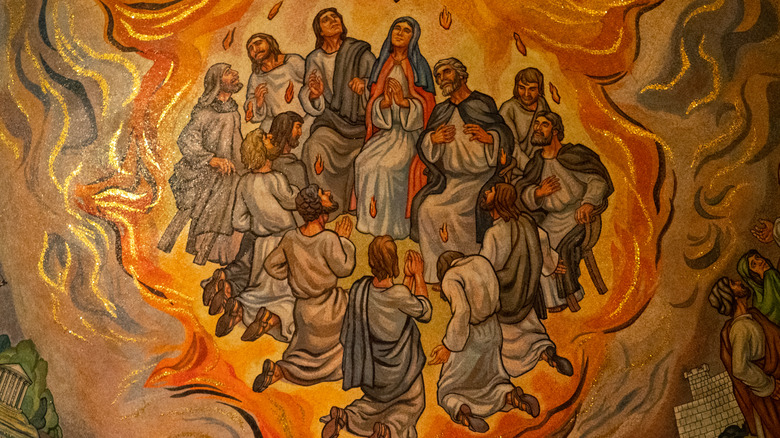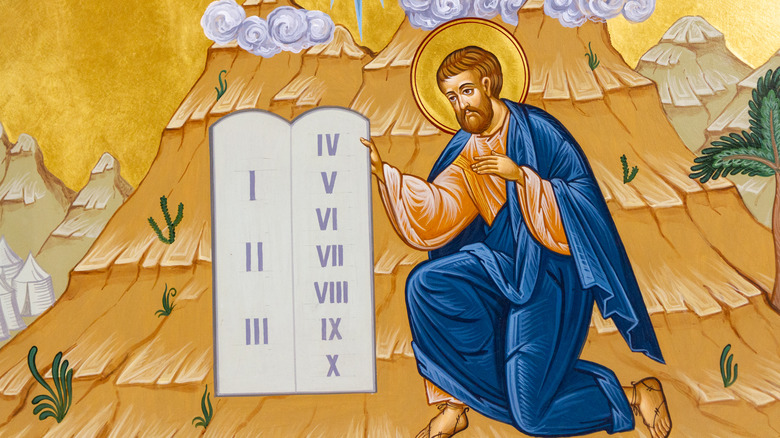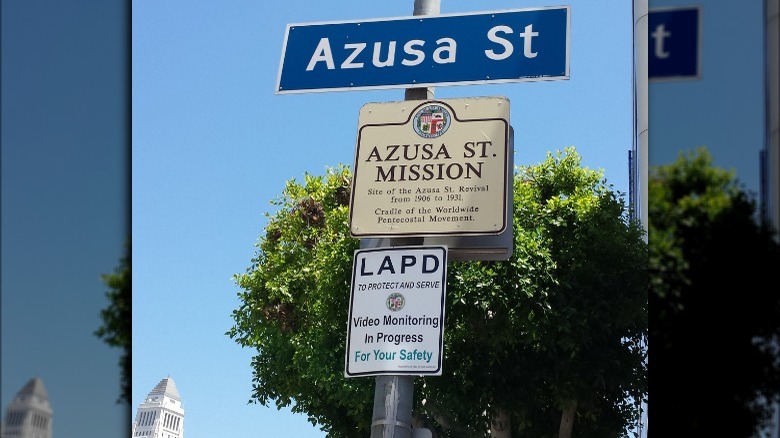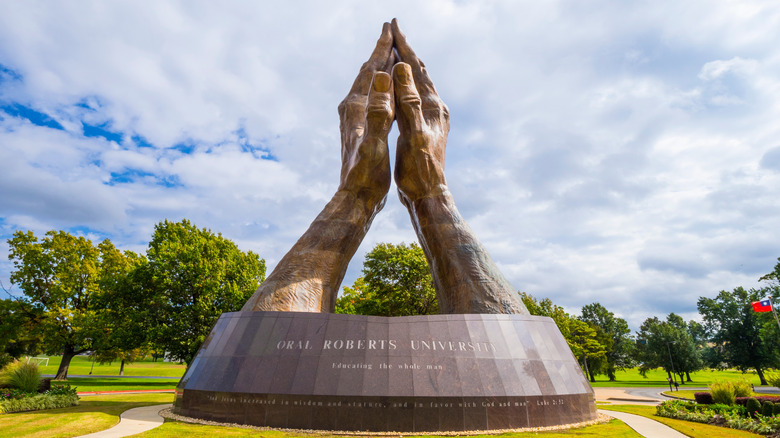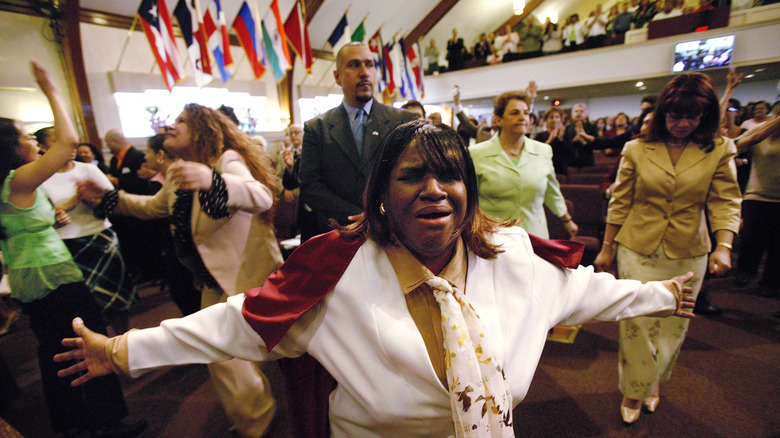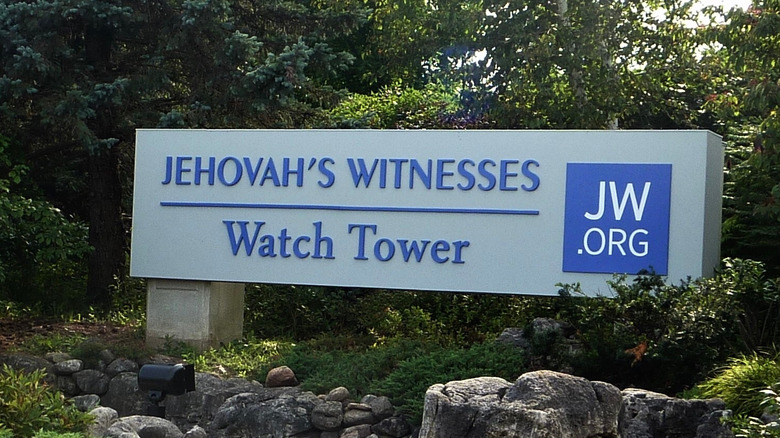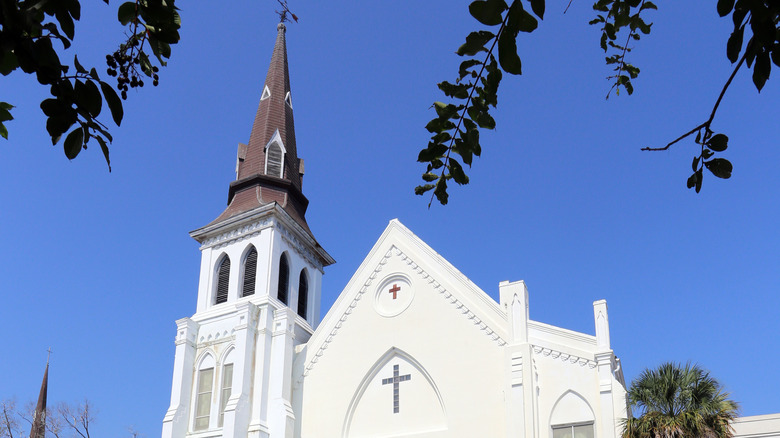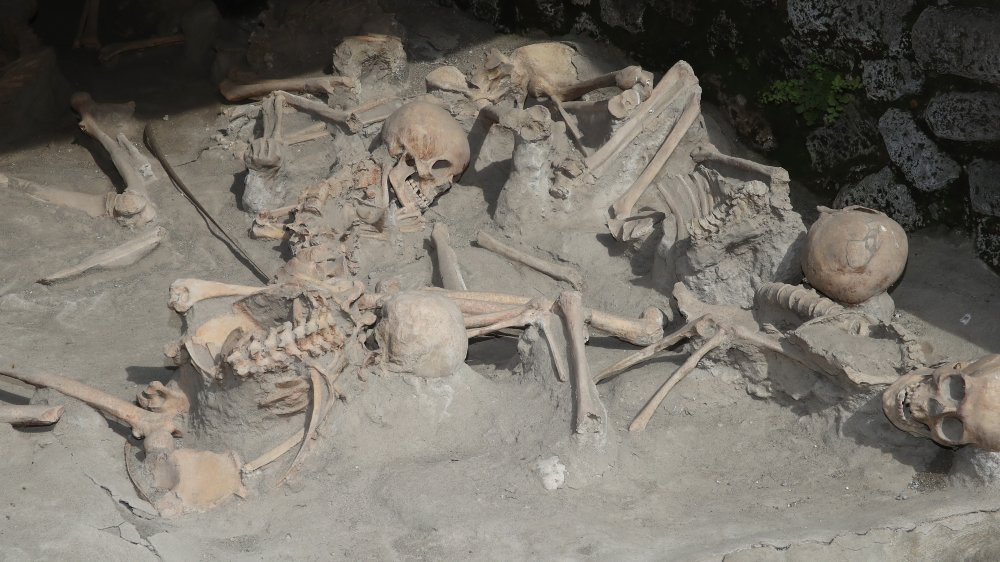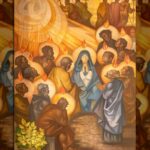
Pentecost Explained
Holidays related to the life of Jesus can be thought of like seasonal bookends. Every spring, people celebrate Easter and Jesus’ resurrection by attending church, going on egg hunts, dressing up in pastels, and devouring chocolate rabbits, as reported by the International Student Guide to the USA. And there’s Christmas, which very loosely commemorates the birth of Jesus. Of course, people celebrate these holidays in many parts of the world. (Even though both contain so many pagan influences it can be hard to find Jesus in them.)
Some scholars hypothesize this is because both holidays pre-date the life of Jesus of Nazareth by thousands of years. Instead of corresponding to Christianity, they find their roots in pagan festivals celebrating the changing of the seasons (via CBS). According to Carole Cusack of the University of Sydney, “Since pre-historic times, people have celebrated the equinoxes and the solstices as sacred times,” per ABC.
Yet, many Christians today overlook one of the most significant events on the Christian calendar, Pentecost, as reported by the BBC. What’s so important about this holiday? Consider it the miraculous birthday of the church (via PBS) and the celebration of the “gift” of the Holy Spirit.
What happened at the first Pentecost?
Pentecost comes from the Greek pentekoste and refers to the number 50, according to the BBC. Or, more specifically, the 50th day after Easter or Resurrection Sunday. Some believers also refer to it as Whitsun, not to be confused with the British bank holiday of the same name. What happened during the first Pentecost that’s still commemorated today?
It’s the day when a small band of Jesus’ followers spontaneously began speaking in various foreign languages, according to Britannica. It’s important to note that these diverse languages were unknown to the apostles, making the event supernatural. What’s more, the Book of Acts describes a “violent wind” preceding the events and “tongues of fire” that came to rest on each of the disciples.
The Book of Acts records, “There were staying in Jerusalem God-fearing Jews from every nation under heaven. When they heard this sound, a crowd came together in bewilderment, because each one heard their own language being spoken” (via Bible Gateway). The crowds marveled at this because the speakers were uneducated, rural Galileans. But others accused them of being drunk. The Apostle Peter defended them, preaching the Gospel message to the large crowd. By the end of the day, more than 3,000 people joined the church.
The Jewish roots of the Pentecost
In the Jewish tradition, Pentecost is known as Shavuot and occurs 50 days (seven weeks) after the feast of First Fruits celebrating the wheat harvest, per The Shalom Center. How did the Jewish people commemorate Shavuot? The Lord told them to assemble on Shavuot for a day of rest and to make “a new grain offering to Adonai” (via the Jewish Voice).
Shavuot also honors the giving of the Torah (first five books of the Bible) and the Ten Commandments to the Jewish people on Mount Sinai by God. This divine revelation involved supernatural wonders. First Fruits of Zion reports, “On the occasion of the giving of the Torah, the Children of Israel not only heard the LORD’s Voice, but actually saw the sound waves as they emerged from the LORD’s mouth. They visualized them as a fiery substance. Each commandment that left the LORD’s mouth traveled around the entire camp and then came back to every Jew individually.”
A traditional Jewish interpretation of Scripture says God’s voice simultaneously fragmented into 70 different languages, a universal declaration. Why 70? Because Noah had 70 grandsons who each fathered a nation, per Jewish Encyclopedia. For Christians, Pentecost fulfilled prophecies found in the books of Jeremiah and Ezekiel. God promised each prophet he would “write” his law on believers’ hearts by filling them with the Holy Spirit in these works. They believe this occurred during Pentecost when the first Christians became the Lord’s mouthpieces through the indwelling of the Holy Ghost.
How Pentecost is celebrated today
Although a Christian holiday, Pentecost isn’t widely celebrated outside of the church like Easter and Christmas are, notes PBS. And not all denominations observe it, reports the Christian Post. But many congregations do, including the Catholic and Eastern Orthodox churches. These churches put together particular messages on the seventh Sunday after Easter. (The date for Pentecost varies because of the fluctuating dates for Easter.)
Some congregations also hold a feast or focus on teaching about the event from the Book of Acts. Ray Pritchard explains, “Modern Christians observe Pentecost as a holiday, not to celebrate a wheat harvest, but to remember when the Holy Spirit invaded the Church in Acts 2” (via Crosswalk). Notable differences exist when it comes to how modern-day Christian churches interpret the significance and meaning of Pentecost.
For example, Catholicism recognizes Pentecost as a “distinct holiday.” But members of the Eastern Orthodox church consider it the final day of Easter and conduct ceremonies accordingly. Messianic Jewish and Christian congregations, which observe traditional Jewish festivals within the context of Christianity, observe Shavuot and Pentecost together, asserting all believers are “bonded together not by rules, but by the Holy Spirit within them” (via Jews for Jesus).
The Azusa Street Revival and the birth of Pentecostalism
You may be wondering: Where does Pentecostalism fit into the mix? It began at the turn of the 20th century in Southern California with the preacher William J. Seymour, per Black Past. The son of former slaves, Seymour led the movement from a church building located at 312 Azusa Street in Los Angeles, California.
What did Seymour preach? He advocated for a second Pentecost won by earnest seekers of God through prayer. He believed that, like the original Pentecost, this revival would involve glossolalia or speaking in tongues. According to Christian History, Seymour soon gained renown for his messages and teaching style, often packing the tiny mission on Azusa Street with hundreds of individuals. Outside, many hundreds more would listen.
What drew so many to his meetings? “The central attraction was tongues, with the addition of traditional black worship styles that included shouting, trances, and the holy dance. There was no order of service, since ‘the Holy Ghost was in control.'” Today, Seymour remains one of the most under-recognized Black pastors in America. And yet his message would have an immense impact on how people worshiped. As reported by Got Questions, Seymour’s dramatic meetings lasted for about seven years with many thousands of believers drawn to these events. Many Pentecostals today harken back to these SoCal meetings as the root of their spirituality.
Impact of the Azusa Street Revival
The effects of the Azusa Street Revival would be felt across the United States and worldwide, per Pew Research Center. Many movements and churches sprang from this revival, including the Apostolic Faith of South Africa and the rise of popular religious figures and faith healers. Among the most famous were Aimee Semple McPherson, Kathryn Kuhlman, and Oral Roberts (via Way of Life Literature).
Of course, a serious downside to all of this also existed. The Pentecostal movement soon earned a reputation for aiding and abetting hypocrites and swindlers. These included preachers like Charles Fox Parham, Jimmy Swaggart, and Jim and Tammy Bakker. The first scandal in Pentecostalism came with Parham, arrested for soliciting a young man (some say teenager), per The Messed Up Church. Even more shocking, a series of violent exorcisms by his followers ended in death, known as the so-called Parhamite Killings.
And who can forget about Jimmy Swaggart’s very public “fall from grace?” There was little wiggle room after photos emerged of the famed preacher with a sex worker outside a shabby hotel in New Orleans, Louisiana, per Greensboro. Famed televangelists Jim and Tammy Faye Bakker also shocked the nation with egregious financial and sex scandals (via ABC News). Pentecostalism came under heavy scrutiny because of these criminal shenanigans.
Speaking in tongues, snake handling, poison drinking, and more
Pentecostals have often been described as being fanatical. And with good reason. It’s hard to know what to make of unintelligible babbling, falling down or being drunk in the Spirit, and spontaneous healings. Some entrenched churches located in Southern Appalachia even participated in downright dangerous activities. These included handling venomous snakes, drinking poison, and picking up burning coals (via Ethos). As you can imagine, the results weren’t always pretty.
According to The Mountaineer, Charles Prince enjoyed no more than a two-month-long ministry after bringing poisonous snakes to Haywood County in the mid-1980s. What cut his ministry short? A fatal rattlesnake bite. How did such an insane practice get tied up with Christianity? Like speaking in tongues, the basis for poisonous serpent-handling came from a passage in the New Testament.
According to Mark 16:17-18, Jesus told his disciples, “And these signs shall follow them that believe; In my name shall they cast out devils; they shall speak with new tongues; They shall take up serpents; and if they drink any deadly thing, it shall not hurt them; they shall lay hands on the sick, and they shall recover.” As Christianity.com notes, many Pentecostals believe the Bible is to be interpreted literally.
'The weird uncle of modern Christianity'
Hypocritical church leaders and bizarre practices in the Appalachians gave many Pentecostals the equivalent of an “inferiority complex.” Or, as one Bible student put it, “They felt as if they were the weird uncle of modern Christianity” (via Christianity Today). But today, many Pentecostal beliefs have gone mainstream and are now incorporated into common worship (like hand raising). According to the Study of Global Christianity, Pentecostals account for a quarter of all Christians.
Why does Pentecostalism account for such a large number of believers? Scholars have put forth various arguments. But many agree that Pentecostalism proves both sensational and exciting. In other words, “it touche[s] the senses of its adherents,” bringing them into a more profound walk of faith. That said, many leaders within the movement would like to move past sensationalism into a deeper and more mature faith. While they might focus on the manifestation of the Holy Spirit through speaking in tongues, they eschew other aspects (such as handling snakes or drinking poison).
If you remove the most salacious associations from the picture, there are many beneficial things that Pentecostalism has contributed to the Christian faith. For example, it has placed a strong emphasis on reinvigorating missionary work, reintroducing the concept of spiritual gifts to Christianity, and more. According to How Stuff Works, Pentecostalism is one of the fastest-growing religious denominations in the world.
A worldwide rather than a national movement
Sure, Pentecostalism got its start in the U.S. But today, it has a more significant following in other parts of the world, according to the Pulitzer Center. Considering the fact Pentecostalism was inspired by ancient events in the Middle East documented in the Bible, perhaps it only fits that it would move from Azusa Street to Main Streets throughout the world.
According to sociologist Jared Bok (via Christianity Today), “Global Pentecostalism saw its roots historically in the US. Yet despite its growth around the world, in the US itself, it’s evangelical Protestantism that is more dominant [and] doesn’t always affiliate with and sometimes even dissociates with Pentecostalism or charismatic forms of Christianity.” Perhaps that’s why Pentecostals turned their missionary efforts towards other nations around the world. In the process, they’ve enjoyed significant successes.
What’s more, Pentecostals have found greater reach in places where Protestantism is underrepresented. Of course, this makes sense since Pentecostalism and Protestantism often operate in opposition to one another. When it comes to building a greater sense of individual faith, particularly among people born into Christianity or “Christian in name only,” Pentecostals and Charismatics have a significant leg up on their Protestant counterparts.
Speaking in tongues isn't just for Pentecostals anymore
More and more Christians worldwide have embraced many tenets of Pentecostalism, from Holy Spirit baptism to speaking in tongues, per the Acton Institute. Yet, they don’t always identify as Pentecostals. Instead, some groups now call themselves “Spirit-filled” or “Spirit-empowered.”
Why move away from the term “Pentecostal”? Because of how loaded it can be. What’s more, it has deep associations with the U.S., and more particularly, the Appalachians (via Appalachian State University). For this reason, many international Christians don’t feel the label suits them. And as for Charismatic versus Pentecostal? According to Christianity Today, the term refers to a movement in the 1960s and the 1970s where people from various denominations received the baptism of the Holy Spirit yet stayed in their original churches.
As for international believers? Many don’t feel distinct ties to events such as the Azusa Street Revival. While they may believe in the power of the Holy Spirit and baptism, they don’t identify with either of the terms “Charismatic” or “Pentecostal.”
Stop it with the miracles, already!
Despite the wild growth of Pentecostal and Charismatic Christianity over the 20th and 21st centuries, not all Christians agree with the foundational beliefs of these groups, per Got Questions. Standing in stark contrast to them are Cessationists and Dispensationalists.
Who are these individuals? They are Christians that believe the miracles and supernatural phenomena experienced by the early church are no longer available to believers today. According to religion writer Richard Ostling (via Patheos), “Cessationists … say the ‘gifts’ of the Holy Spirit in the New Testament were special phenomena that God gave to help establish the Christian church but appropriately died away.” For this reason, Cessationists prove highly critical when it comes to the so-called gifts of the Spirit. What’s more, Ostling notes that many operate from the premise that supernatural events shouldn’t happen at all. That means no healings and no speaking in tongues. It also means leaving the poison and venomous snakes at home.
Of course, such beliefs prove polar opposites to what Pentecostals and Charismatics believe. Pentecostals and Charismatics step out in faith like the first Christians at Pentecost, looking for connection with their forefathers and mothers through the Holy Spirit. What’s their response to the criticisms of Cessationists and Dispensationalists? According to pastor Bob Deffinbaugh (via Bible.org), those who believe the gifts of the Holy Spirit remain available to believers today argue that “spiritual gifts are divinely bestowed strengths through which we may minister to the weaknesses (and needs) of others.” The weaknesses and needs haven’t gone away, so why would the gifts?
Science meets spirituality
Christian churches today remain widely split when it comes to speaking in tongues, prophecy, and healing through prayer and laying on hands. Yet, it’s impossible to argue that these weren’t facets of the early church in the Book of Acts (via Crosswalk). Did these miraculous happenings come to an end once the church gained in membership and following? That’s a question that Pentecostals, Charismatics, and Cessationists will continue to argue.
On the one hand, many mainstream denominations strongly discourage believers from babbling in foreign or unknown languages. Believers who speak in tongues may even get expelled. On the other hand, churches with a Pentecostal or Charismatic bent don’t believe followers have received the baptism of the Holy Spirit until they manifest this gift, according to ABC 13 News.
These Christians describe speaking in tongues as a very personal experience involving communicating in spiritual or angelic languages that only God and the heavenly host can understand. But what does science have to say about the matter? Dr. Andy Newburg studied brain scans of people speaking in tongues and found that the part of the brain that controls speech wasn’t active when these participants were speaking in tongues (via ABC 13 News). What does this research mean in the broader context of Pentecost? It’s hard to know. But it adds another layer to a fascinating phenomenon in the Judeo-Christian tradition.

What Really Happened To The Ten Commandments Tablets?

The Anti-Seatbelt Movement Explained

The Strange Details Surrounding Brianna Maitland's Disappearance

What Queen Esther Really Looked Like In The Bible

What You Might Not Know About Hitler's Wolf's Lair

Inside The Time The U.S. Lost A Hydrogen Bomb In The Ocean

The Lost Leonardo: The Stunningly Low Amount Salvator Mundi Sold For In 2005
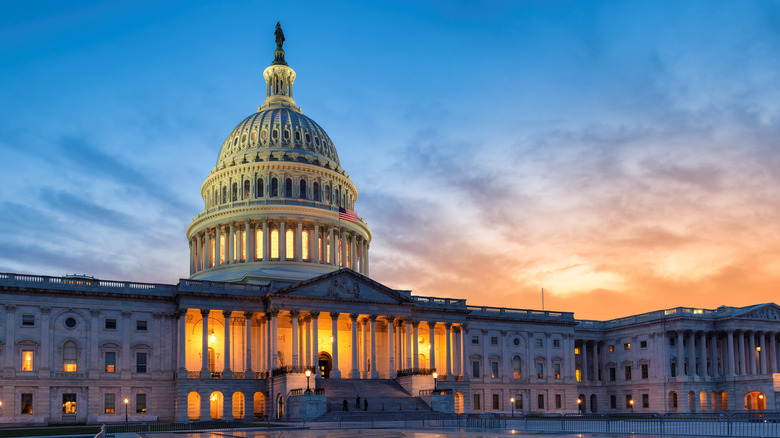
The Surprising Reason America Could Potentially Collapse In Our Lifetime

How Serial Killer Nannie Doss Was Finally Caught

The Real Story Behind Rick Springfield's 'Jessie's Girl'
